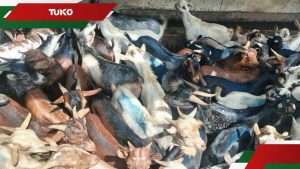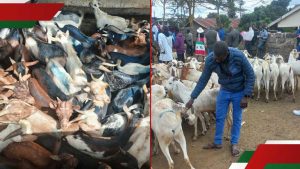Columns
The Federal Government has launched an investigation into the alleged unauthorised sale of National Identification Number (NIN), following revelations that the personal data of Nigerians were available for purchase online at a fee.
Published
7 months agoon
By
Ekwutos Blog
The revelation has sparked widespread concern regarding the protection of individual privacy rights and potential economic repercussions.
The Minister of Communications, Innovation, and Digital Economy, Dr. Bosun Tijani, while addressing the issue confirmed he had begun discussions with the Minister of Interior, Olubunmi Tunji-Ojo, on the matter.
The Ministry of Interior currently oversees the National Identity Management Commission, the body responsible for managing Nigeria’s identity database.
“While I have engaged with my counterpart at the Ministry of Interior regarding this matter, I am confident in their commitment to safeguarding our national identity data,” Dr. Tijani affirmed in a statement released on Wednesday.
He expressed confidence in the ongoing efforts of both the Ministry of Interior and NIMC to address the issue promptly.
Last week, Paradigm Initiative raised the alarm after uncovering instances where NINs, Bank Verification Numbers (BVNs), and other sensitive personal information were purportedly available for sale online, citing direct extraction from government databases.
The Executive Director of the organisation, Gbenga Sesan, said that the data being sold on the websites were sourced directly from the government’s databases.
“The problem is not Nigerians because we were able to confirm that what they were selling is NIMC’s data and we have proof. We got the NIN slip of the Minister of Communications, Innovation, and Digital Economy, Dr. Bosun Tijani. We got the NIN slip of the number one data regulator in Nigeria, Dr. Vincent Olatunji. We bought them for N100 each to demonstrate that this is not a joke,” he said.
Although declining to confirm specific claims made by Paradigm Initiative, regarding the illicit sale of Nigerians’ personal data, Tijani confirmed that the Nigeria Data Protection Commission had commenced an inquiry into the alleged breach.
“The NDPC, a year old agency under my supervision as minister, has over the last few months created data compliance mechanisms for all MDAs and has since started a thorough investigation as to the circumstances surrounding this alleged breach, “ the minister said.
Highlighting the importance of a robust Digital Public Infrastructure (DPI) and streamlined data exchange protocols across government agencies, Tijani underscored his administration’s dedication to enhancing Nigeria’s cybersecurity resilience.
“Having established that, I do believe that it is important to share the proactive steps I have taken upon appointment to help strengthen technology application in government, despite the historically siloed approach to procurement and development,” the minister said.
He emphasised that shortly after assuming office, he published a comprehensive strategy outlining his vision for integrating advanced technology into public sector operations to drive economic growth.
Meanwhile, NIMC had issued a statement on Saturday refuting allegations of any security breaches within its database, asserting its implementation of stringent cybersecurity measures to safeguard the integrity of Nigeria’s national identity database.
The commission had also warned Nigerians to desist from sharing their data with fraudulent websites. The claims by NIMC that data were sourced from other sites other than its platform contradict the findings of Paradigm Initiative.
In March there were media reports that a website known as expressverify was monetising the recovery of NINs and personal information from the Nigerian identification database.
The website reportedly had unrestricted access to NINs and personal details of Nigerians registered in the nation’s identity database managed by NIMC.
This incident prompted the NDPC to heighten scrutiny of NIMC licensees after the website breached data protection protocols.
Experts, who spoke to The PUNCH earlier said though there were no cases of data breaches in the NIN database, illegal entries from third-party sources to endpoints have proliferated the system.
The PUNCH gathered that there might be regulated actors reselling or providing access to NIN data through APIs (application user interfaces) via a reselling service, which is not being properly monitored.
You may like


POWA HONOURS HON DR SAMUEL UDEH WITH AN AWARD OF RECOGNITION; hands over to police, huge sum of cash forgotten by a passenger in a bus


Nathaniel Bassey Brings Soul-Stirring Worship to Trump’s Inaugural Prayer Breakfast


Putin Hails Trump On Inauguration As US President For Second Time, Says Russia Willing To End War


Court remands suspect over alleged assassination attempt on Lokpobiri


“Akpi Is Back”: Speed Darlington Finally Regains Freedom After 2-Months in Jail, Fans React Nosa Oke-Hortons


42 Executive Orders By Trump On the First Day
Columns
“Why men should marry poor women” – Mr Nigeria (VIDEO)
Published
4 days agoon
January 18, 2025By
Ekwutos Blog
Nigeria’s top influencer, Ugochukwu Nwokolo, popularly known as Mr. Nigeria, recently shared his perspective on why men should consider marrying women from less privileged backgrounds.
Speaking on a recent episode of The Honest Bunch podcast, Ugochukwu expressed his belief that poor women possess certain qualities that make them ideal partners, citing their prayerfulness and fertility as key attributes.
In his words, “Poor girls turn me on. The poorer she is, the more attractive I find her. A poor woman will wake up at 7:00 a.m., join NSPPD, and pray fervently for her husband. She’ll say, ‘I’m putting my husband on the fire altar.’ When it comes to fertility, poor women can be incredibly fertile.”
Ugochukwu Nwokolo is the first-ever Mr. Nigeria Supranational, crowned by the Silverbird Group under the Mister World Nigeria platform. He will represent Nigeria in the Mr. Supranational competition held in Poland.
FOLLOW THE LINK BELOW TO SEE VIDEO:
https://x.com/OneJoblessBoy/status/1880540913497518518?t=WFcx7Q6extTGZjdFyNkSww&s=19
Columns
Do you know that an Att0rney General in Nigeria can walk into any c0urt while a Cri’minal case is going on and put a st0p to that cri’minal case
Published
4 days agoon
January 18, 2025By
Ekwutos Blog
Do you know that an Att0rney General in Nigeria can walk into any c0urt while a Cri’minal case is going on and put a st0p to that cri’minal case
I mean any crim’inal case at all, if you like make e b the case wey dey kpai person or make e be R(@)P£ case or anyone at all
And they have the p0wer to do so without any explanation at all
They can just walk into any c0urt room and say this crim’inal matter will not proceed anymore
I am exercising my p0wer of nolle prosequi as an Att0rney General in Nigeria
Chai, this p0wer sweet
P0wer to st0p any case you want
Ignorance of the law is no excuse
Columns
Baringo man uses KSh 2m cash gift from William Ruto to expand online goat marketplace
Published
5 days agoon
January 17, 2025By
Ekwutos Blog
- Efarmer Goats Initiative, which has transformed goat farming through innovation, was conceived on December 1, 2023
- The website helps people who are looking for goats to buy them at an affordable price and get them in different corners of the country and the world
- When Enock Kimosop explained his idea to President William Ruto in December 2024, he got a KSh 2 million cash gift from him, and he told TUKO.co.ke that it helped expand his business
Baringo: Enock Kimosop, a man thriving in the goat business, has shared how a KSh 2 million gift from President William Ruto helped him increase his number of goats and better utilise his form of transportation.

Enock Kimosop when he was gifted by William Ruto (l), the Efarmer founder (r). Photo: Enock Kimosop. Source: UGC
How was Efarmer Goats idea conceived?
Speaking to TUKO.co.ke, Kimosop shared that the concept of the Efarmer Goats Initiative, which transforms goat farming through innovation, was conceived on December 1, 2023, during the annual Kimalel Goat Auction.
“I was inspired by speeches from dignitaries at the event, which emphasised the need to make the process of buying and selling goats digital,” he said.
“The idea of selling goats online took root as a way to modernise the traditional goat farming business and address challenges in market access,” he added.
How did Kimosop get Efarmer website started?
Enock started to put his idea in motion; he reached out to his friends from Strathmore and another lady who helped build the website.
The site went live on April 2, 2024, and the group had a vision of transforming the website into an app within a year if it was successful.
Just as with many other businesses, Enock didn’t have all the cash needed to start, so he got together with some friends, and they contributed KSh 150,000 each; in the end, they had a capital of KSh 600,000, and they started their businesses of selling goats online.
How else did the Kimalel meeting help Efarmer?
“Our first sales took place during the Idd Mubarak celebrations in 2024, where we successfully sold 200 goats to individuals and butcheries; some were taking upto 10,” said Enock.
On December 17, 2024, Enock returned to the Kimalel Goat Auction to showcase his firm’s initiative. The president and other stakeholders helped them gain significant visibility, allowing them to penetrate the market at an accelerated pace.
“The KSh 2 million from the president helped boost the businesses with more goats. Initially, we were also transporting a few goats which was costly but now they can get return on investment,” he said.
“Despite our progress, transportation costs remain a significant challenge. Renting trucks for goat transportation is expensive and inefficient. To address this, we are actively exploring options to acquire our own lorry, which would greatly reduce logistics costs and enhance profitability,” he added.
How does Efarmer source goats?
Over time, Efarmer Goats identified reliable sources of the animals, ensuring consistent supply and competitive pricing.
Once Efarmer Goats has found the best breeds needed by the clients, they transport them on a lorry to Nairobi, where they have since found a holding ground in Rongai. At the holding ground, the goats are fed well and rest.
“It is important that they are fed and rest well so that their kgs do not go down after slaughtering,” insisted Enock.
Enock Kimosop at the Kimamel goat auction (r), some of the goats being sold (l). Photos: Enock Kimosop. Source: UGC
How has the evolution of Efarmer happened over time?
Today, Efarmer Goats has established a foothold in international markets as well, and Enock said that they now have a client from Dubai who orders 1000 goats from them on a monthly basis.
“We are managing 300 goats weekly and we sell to him per kilogram. There is also another Saudi Arabia client who is reliable,” he said.
Efarmer Goats prioritises reliability and efficiency. They aim to build client trust while empowering local farmers through sustainable practices and innovative solutions.
One such solution is a mobile app where farmers will be able to upload their goats for sale directly onto the platform, connecting them to buyers within their region.
“This platform will be cost-effective, with farmers only paying a small website application fee,” said Enock.
“We aim to fully exploit global opportunities, increasing our export capacity to handle goat sales in bulk quantities (measured in tons),” he added.
There are also farmer empowerment programs, where Efarmer Goats buys kids from farmers for KSh 6,000, provides guidance on rearing them, and facilitates sales at significantly higher prices (between Ksh 12,000 and Ksh 15,000) after a year.
This initiative ensures farmers achieve higher returns while enhancing their rearing skills.

Efarmer’s goats being held before they are sold. Photos: Enock Kimosop. Source: UGC
What are some of the challenges Kimosop faced?
Efarmer Goats expanded its reach to Nairobi, selling both through the website and offline. However, the initial phase was marked by significant challenges.
Among them was the high cost of transportation; transporting goats using large trucks, despite having only a few goats per trip, inflated operational costs.
“Inconsistent and high purchase prices for goats in some regions negatively impacted profitability. These logistical and supply chain issues led to initial losses, prompting us to refine our operations,” shared Enock.
Apparently, the future of goat farming in Kenya lies in technology, collaboration, and a relentless pursuit of excellence. Efarmer Goats said they embody those values as they continue to grow and transform.
Thika farmer frustrated by gate prices turns to grocery business
Elsewhere, on January 13, 2024, Sebastian Peter became the proud owner of two grocery shops in Thika Ngoingwa Estate, Mangu Road.
According to Peter, a friend lent him money to start leasing land for his vegetables, but later, he was frustrated by people who would buy them at KSh 3 and sell them between KSh 50 and KSh 100.
Speaking to TUKO.co.ke, Peter shared that he started as a hawker for his produce, such as kales, but over time, gate prices frustrated him, and he opted to start food kiosks.
Proofreading by Mercy Nyambura Guthua, journalist and copy editor at TUKO.co.ke

POWA HONOURS HON DR SAMUEL UDEH WITH AN AWARD OF RECOGNITION; hands over to police, huge sum of cash forgotten by a passenger in a bus

Nathaniel Bassey Brings Soul-Stirring Worship to Trump’s Inaugural Prayer Breakfast

Putin Hails Trump On Inauguration As US President For Second Time, Says Russia Willing To End War
Trending
- Politics11 months ago
Nigerian Senate passes Bill seeking the establishment of the South East Development Commission.

 Business11 months ago
Business11 months agoInflation hits record high of 29.90% on naira weakness

 Politics8 months ago
Politics8 months agoBREAKING: Federal Gov’t Offers To Pay Above N60,000, Reaches Agreement With Labour

 SportsNews11 months ago
SportsNews11 months agoOlympic Qualifiers 2024: CAF Confirms Dates For Super Falcons Vs Banyana Banyana

 Trending3 months ago
Trending3 months agoNYA demands release of ‘abducted’ Imo chairman, preaches good governance
- Business3 months ago
US court acquits Air Peace boss, slams Mayfield $4000 fine

 Politics11 months ago
Politics11 months agoGovernor Hope Uzodinma’s New Cabinet In Imo: The Gainers, The Losers

 Politics3 months ago
Politics3 months agoMexico’s new president causes concern just weeks before the US elections


